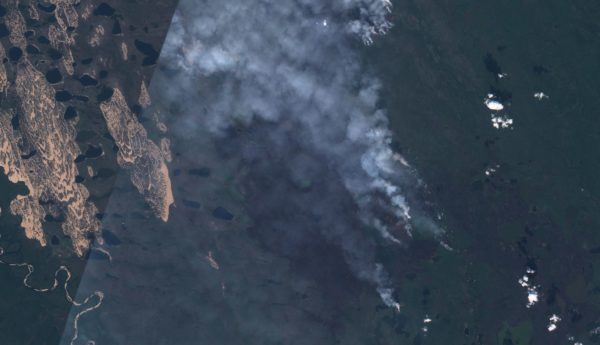'Unearthed',
onderdeel van Greenpeace bracht op 10 augustus jl. een artikel over
de vele bosbranden die vrijwel wereldwijd hebben huisgehouden, of
nog steeds niet zijn geblust.
Ongelofelijk
als je de satellietfoto's ziet die maar tot één conclusie leiden: de
klimaatverandering zal met dit soort warme jaren (waar we er naar
zeggen nog een paar voor de boeg hebben de komende 4 jaar) nog sneller gaan dan eerder berekend.
Uiterst verontrustend zijn de branden in het hoge noorden, van
Alaska, Canada, tot Scandinavië en Siberië, dit daar enorme gebieden
met permafrost snel ontdooien, waarbij grote hoeveelheden methaangas
vrijkomen.....

A vast wildfire north of the Siberian city Yakutsk, Russia. Last month, NASA reported that smoke from fires in the taiga forest region in Siberia was reaching Canada. Source: Sentinel-2
Methaangas, ook in gigantische hoeveelheden geproduceerd door onze intensieve
martelveehouderij, waar jaarlijks 500 miljoen dieren worden groot en
doodgemarteld, is een uiterst sterk broeikasgas..... Voorts is er nog de CO2 uitstoot, weliswaar niet zo sterk als methaangas, maar wel uur na uur in ongelofelijk grote hoeveelheden toegevoegd aan onze atmosfeer
Niet alleen
voeren de genoemde bosbranden extra warmte toe aan de atmosfeer, maar
door het vrijkomen van methaangas zal de aarde nog verder opwarmen en
zal er nog meer broeikasgas vrijkomen, dit herhaalt zich zoals je
begrijpt en dat is wat het cumulatief effect wordt genoemd........
Door
de opwarming van de aarde smelten ook de poolkappen en gletsjers wereldwijd, waar dit ijs is
verdwenen zal de warmte die eerder werd teruggekaatst, nu de aarde
en het zeewater opwarmen, waardoor er nog meer ijs zal afsmelten, ook
dit herhaalt zich en ook hier is dus sprake van een cumulatief
effect......
Het voorgaande geeft aan dat we het punt waarop we nog werkelijk iets zouden kunnen doen, al gepasseerd zijn ('point of no return').....Het
is dan ook zeker dat met voornoemde zaken de temperatuur aan het eind
van deze eeuw met meer dan 3 graden zal zijn toegenomen, zelfs al
zouden we vandaag alle 'mooie voornemens' (veel te slap!) doorvoeren
en bijvoorbeeld zelfs zullen besluiten de Nederlandse kolencentrales
niet in 2030, maar onmiddellijk te sluiten......
Echter Greenpeace durft te stellen dat het zo'n vaart niet zal lopen, ondanks het volgende weinig geruststellende schrijven van NB deze organisatie zelf (ongelofelijk!):

As you read this, thousands of firefighters are battling the largest fire in California’s historyalongside members of the national guard.
With a heatwave battering the northern hemisphere for much of the summer, 2018 has seen an unusually high number of wildfires, many in unusual areas.
Using this map, you can see satellite images from the last 24 hours of wildfires all over the world, from the historic Mendocino fire in northern California, to vast wildfires in Siberia.
What we’re reading
California fire is the largest in history
The Mendocino Complex fire was classified at the start of this week as California’s largest wildfire, and officials have said it will not be fully extinguished until early September. Meanwhile, Donald Trump of course had to pitch in (inaccurately); about water usage for the wildfires.
Fires have been sweeping across the world in the past few months, with temperatures reaching over 40C in Spain and Portugal last weekend, while scientists have warned that the fires in northern England may leave behind a “toxic legacy” of smoke.
Is there a point at which it is futile to reduce emissions?
That’s what a new study is exploring, portraying a widely-publicised future called ‘hothouse Earth.’
What’s ‘hothouse Earth’? Well, the study warned that a series of cascading events could move Earth into a state beyond which there was no return. Essentially, the study warned that even limiting global warming to 2C might not be enough for stable future temperatures.
However, the suggestion that there was a point at which events were no longer avoidable was criticised by other scientists, including Professor Simon Lewis, who once featured in a video for us, and those who broke down the nuance in the science.
“Lawful but awful” - more on dieselgate
Three years on from dieselgate and the hot air from car companies continues. Or perhaps polluted air would be more accurate.
The US has long had stricter fixes for VW’s polluting cars than Europe did, and companies are therefore exploiting legal loopholes that exist to change test results - and have been doing so for some time. A study has also suggested that diesel isn’t great in heatwaves.
Unbeelievable
I may have lost track of how many regulatory rollbacks the Trump administration has proposed, but this one is a real buzzkill. A ban on the use of pesticides which are linked to declining bee populations has been overturned.
It was announced by the US Fish and Wildlife Service, whose deputy director said the blanket ban on neonicotinoid pesticides and GM crops in refuges would end. They will instead make decisions about their use on a case-by-case basis.
==================================
PS: ik wil niet beweren dat we verder maar niets meer moeten doen, nee we moeten juist wel veel meer vaart zetten achter maatregelen die de opwarming nog enigszins afremmen. Zeker daar het ook in het belang is van het grote aantal mensen dat jaarlijks wereldwijd vroegtijdig sterft (na een akelig ziekbed, in Nederland rond de 18.000 mensen op jaarbasis) als gevolg van de luchtvervuiling van auto-uitstoot, uiteraard aangevuld door uitstoot van vliegtuigen, schepen, (kolen gestookte) energiecentrales en de industrie.......
Geen opmerkingen:
Een reactie posten